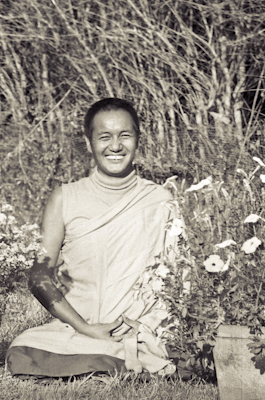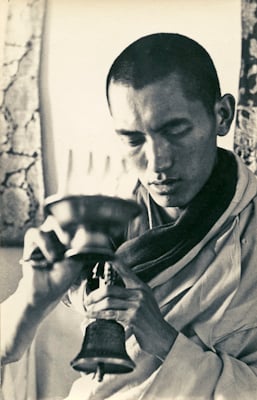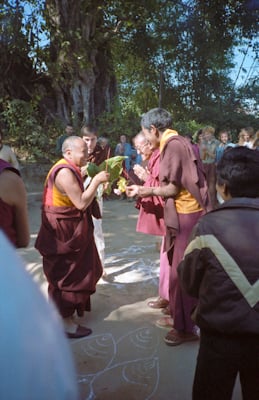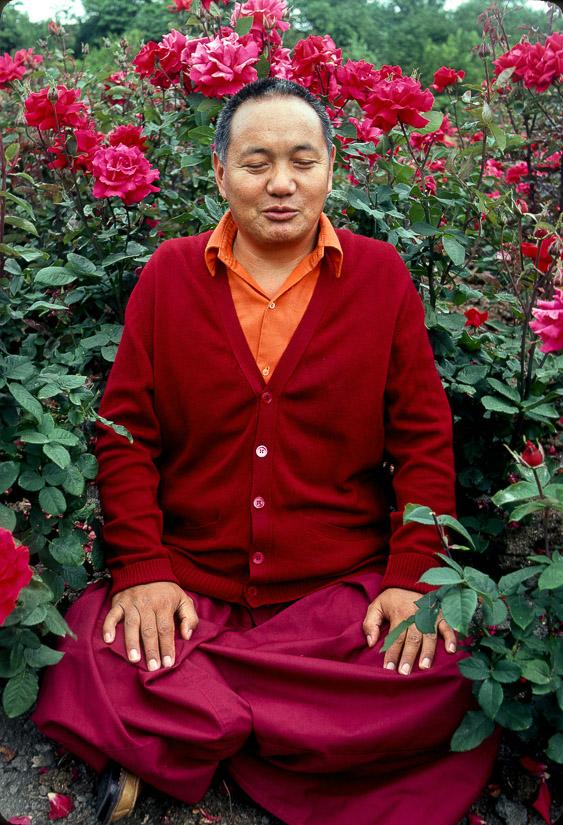Dear Friends,
Welcome to the 200th LYWA eletter! We are so grateful for your support that has allowed us to do this work. Please take a glance at what we’ve been able to accomplish these past 200 months together and rejoice!
We are very happy to be sending you this 200th eletter on losar, Tibetan New Year’s Day, and wish you and your family all the best for the coming year! And, of course, losar is one of the days we celebrate the life of Lama Yeshe, who passed away at dawn on losar, 1984 (the other day is March 3, the Western date that Lama left us). We are so honored to be publishing his official biography in the coming weeks. Just a reminder that the pre-order period offering discounted shipping closes on February 27. FPMT center bookstores are eligible for a 50% discount on the retail price and can also save on shipping costs by pre-ordering Big Love.
ON THE LYWA PODCAST: Lama Yeshe on Integrating what you have heard
I know you people understand something, have discovered something; but many things are only intellectual and not yet realization, therefore, I think you need something more.
—Lama Yeshe
 In the early 70s, Lama Yeshe gave Sunday afternoon lectures at Kopan Monastery and people would come from all around to listen. This month’s podcast is the earliest known recording of Lama Yeshe teaching Westerners. In this talk, Lama emphasizes the importance of actually practicing the teachings and concludes with a lively question-and-answer session with the students. You can read along with the unedited transcript here on our website.
In the early 70s, Lama Yeshe gave Sunday afternoon lectures at Kopan Monastery and people would come from all around to listen. This month’s podcast is the earliest known recording of Lama Yeshe teaching Westerners. In this talk, Lama emphasizes the importance of actually practicing the teachings and concludes with a lively question-and-answer session with the students. You can read along with the unedited transcript here on our website.
The LYWA podcast contains hundreds of hours of audio, each with links to the accompanying lightly edited transcripts. See the LYWA podcast page to search or browse the entire collection by topic or date, and for easy instructions on how to subscribe.
WHAT'S NEW ON OUR WEBSITE
 We are delighted to share with you Practicing Dharma in the West: Q&A With Lama Yeshe. In this teaching, Lama Yeshe discusses the essence of Buddhism and other religions and advises students how to integrate Dharma when they return to the West. This was one of Lama Yeshe’s final teachings before he passed away in 1984 and was given during the Sixteenth Kopan Meditation Course in 1983. Edited by Uldis Balodis. You can read an excerpt from this teaching in our e-letter below.
We are delighted to share with you Practicing Dharma in the West: Q&A With Lama Yeshe. In this teaching, Lama Yeshe discusses the essence of Buddhism and other religions and advises students how to integrate Dharma when they return to the West. This was one of Lama Yeshe’s final teachings before he passed away in 1984 and was given during the Sixteenth Kopan Meditation Course in 1983. Edited by Uldis Balodis. You can read an excerpt from this teaching in our e-letter below.- First Time at a Kopan Course: Rinpoche sent this letter to a student who was planning to go Kopan Monastery in Nepal for the first time to attend a meditation course.
- Benefits of Karma Yoga: A student wrote that doing karma yoga while also studying at the center required a lot of energy and time. Rinpoche gave this advice about the attitude for doing karma yoga.
- How to Achieve Enlightenment Quickly: Rinpoche explains why Highest Yoga Tantra is the quickest way to achieve enlightenment and outlines the levels of completion stage practice.
- The Object to Be Refuted: Advice about the subtle object to be refuted according to the Prasangika Madhyamaka view.
- Practices for Coronavirus: Rinpoche was asked what could be done for the recent outbreak of coronavirus (COVID-19), which has now been declared a global health emergency.
- Helping People With Suicidal Thoughts: Rinpoche gave this advice to a student who had written about her work helping people with suicidal ideation.
You can always find a list of all the newly posted advices from Lama Zopa Rinpoche on our website.
News on BIG LOVE

Nick Ribush
Director
THIS MONTH'S TEACHING: Dharma in Daily life
 Lama: If you have any questions—and you should have—you are welcome to ask. We will try, OK. Thank you.
Lama: If you have any questions—and you should have—you are welcome to ask. We will try, OK. Thank you.
Student: How do we practice Dharma in the West while working full-time and living in the city with many personal and professional commitments? How can we adapt the teachings of the Buddha and integrate them fully into daily life? In what can we take sincere refuge?
Lama: How to answer that? Now, first of all, what is Dharma? What is Buddhism all about? It looks like so many subjects, so many philosophies, so many meditations, so much psychology. You feel there are so many things going on in Buddhism.
Being really practical, do whatever you can according to your level. I think it’s a gradual path to enlightenment, isn’t it? I cannot say, “This is the way to do it.” If I say, “This is the way it should be,” it’s a joke, it’s not true. It is according to your life, according to your consciousness, your way of developing, your existence.
In Buddhism we say we are not suddenly born from our mama like a mushroom; we have a long history of many, many, many lifetimes. Each of us is different and we have different realizations according to our life experiences, our own consciousness or the way we have developed. Do you understand? We are all on different levels.
When we reach enlightenment, buddhahood, we will be at the same level—one universal consciousness—then there is no distinction between you and me, him and her. But at this moment, as long as we are tied up in dualistic, superficial concepts, worldly concepts, we cannot break out of where we are. We are suffocated, full of concepts, full of relative interpretations, full of relative mind. This is our suffocation. There are different degrees of suffocation, that’s why each person should do what they can according to their own level.
In practical terms what Buddhism really teaches us is to have sympathetic loving kindness toward others and to ourselves too. The second thing Buddhism teaches us is about our ignorance: that we are repeatedly mistaken, repeatedly uncontrolled. It doesn’t matter that we are intelligent, we are repeatedly mistaken, again and again. Sometimes we know something intellectually, but our intellectual understanding is not sufficient; it is just some kind of weak mind and weak life. That doesn’t bring indestructible protection. It takes time. I don’t know what I’m talking about!
Buddhism teaches two things: loving kindness for others, which eliminates self-cherishing concepts, and wisdom eliminating ignorant wrong conceptions in order to realize universal reality. I’m sure you’ve heard of shunyata or wisdom; this is the most important thing for human beings, for all of us. Without wisdom we are already mistaken, we can’t see. Check out how our lifestyle has been. When we choose certain things for our life, sometimes they bring us satisfaction but many times they bring misery and dissatisfaction. So, from all these things we can see how we make mistakes too many times. We have already made mistakes up to now, we are making mistakes now, today, and we will make mistakes continuously. We will, we will; there’s no choice! It’s not something intellectual. It’s just what we are, unfortunately.
We know intellectually that loving kindness and dedication for others is the only way to really bring satisfaction. We have no doubt, we know that. Maybe we have had some experience through the intellect. We can see that without having kindness for others, without dedication for others, there is no way to have satisfaction. It’s the same thing for wisdom.
Wisdom also has many levels. I’m sure you have heard about this. We say “shunyata” but that is just a word. If I ask you people, if I interview each person, asking, “What is shunyata?”—if I pick one person each hour and ask this, everybody will have a different idea. Sometimes shunyata is something to do with experience; sometimes there are no words. Buddha said it is not words. It’s true, the experience of real shunyata is without concepts, without interpretation—we totally lose dualistic concepts. Describing that experience without words is not possible, but when we use words we are not opened, we are full of concepts. That’s typical; I’m sure all of you have also had some experience of shunyata, but when you describe it in words, somehow it doesn’t come out exactly. I think it never, ever comes. No way!
The essence of Buddhism is true compassion, loving kindness for others, and gaining intensive awareness and wisdom—our totality nature. That is Buddhism’s business. So, to do this business, to integrate this into society you don’t need anything; you don’t need to wear this robe. You don’t need to actually say Tibetan words; you can do it in your own language. You don’t need to do Tibetan-style prostrations; you can do Western prostrations. You can transform Tibetan prostrations into a Western way. What I mean is you don’t need to do all those Tibetan rituals—the prostrations, the prayers, those things. In my opinion you don’t need to do any of these at all.
What you should do is the essence: really learn true love and how to technically practice it, and how to practice true wisdom. Don’t think about wisdom. Wisdom is awareness or comprehension and knowing what’s going on in your mind. That’s the only business—you should not worry about what’s going on in other peoples’ minds, your friends’ minds. That’s difficult. First you should concern yourself with what’s going on in your own mind and try to know your own condition of consciousness; how to operate daily and how to go into the universal reality of your own consciousness. That’s the way to integrate, I think.
You should not worry about rituals. Buddhism went to many different cultures—India, Tibet, China, Korea, Thailand and Burma. Everybody does it differently. Everybody makes different prostrations. Anyway, Buddha taught different prostrations to different disciples. It’s never the same. So, as Buddhism goes to the West it is taking another shape, a Western shape. It’s the only thing to do, so I don’t think you should worry.
If you are thinking, “Only the words, the prayers and rituals of Tibetan Buddhism are true, and this is the only way I can practice, by using Tibetan Buddhism,” then you cannot integrate it. For sure! So, I think your business is to take the essence, the real nucleus of Buddhism. Do you understand? Don’t take something which you cannot understand, thinking, “This Himalayan mountain way is good.” We are dealing with sea level! Sea level—always playing with fish, whales, swimming. We like to fish. Alright!
Buddhism teaches us how to develop loving kindness and I think this way may be the simplest. Buddhism does not merely say, “You should love everyone.” Why should we have love? How do we generate this energy? We should do this meditation. Besides meditation, if we want to develop loving kindness there are a lot of things to do in the Western world, like helping poor people or sick people. In the West we have everything, and we have a complicated life. We should use our life to serve others and not just space out with thinking meditation. Act physically to help others as much as you can—that is your sadhana. I think that’s all. I can’t see any complication.
In the Western world, meditation is part of the international language now. I don’t think that if you’re not doing meditation you’re very bad. Meditation is not only sitting. Meditation is also thinking about something. For example, let’s say you have to work until four or five o’clock and when you come back you are already tired, exhausted. So you come back and maybe lie down, then you think about that day—your work, how people reacted, how your mind worked, how many times you became angry, how many times disturbances happened. That’s a kind of meditation, thinking, “Is it worthwhile or not?” I think that’s good enough.
Lama Yeshe gave this teaching during the Sixteenth Kopan Meditation Course held at Kopan Monastery, Nepal, in November–December 1983. You can find the whole teaching here on our website.





























